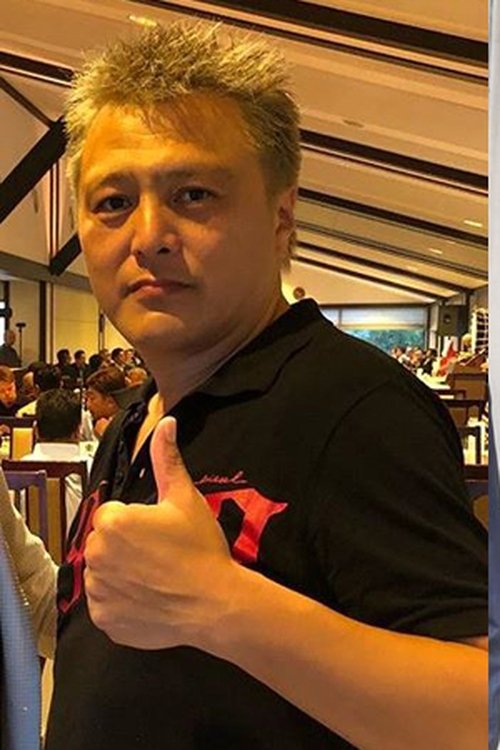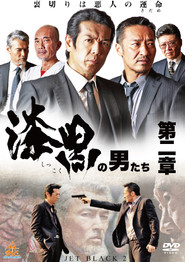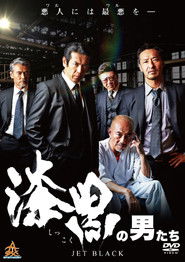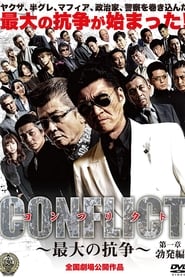detail profile akihiko kuwata

Akihiko Kuwata
桑田昭彦
atau dikenal sebagai
Info Pribadi
Peran Yang Di Mainkan Akihiko Kuwata
 Kensuke Sonomura directs the legendary Hitoshi...
Kensuke Sonomura directs the legendary Hitoshi...Bad City 2022
Kensuke Sonomura directs the legendary Hitoshi Ozawa in this ultimate V-Cinema actioner. Kaiko City is plagued with poverty and crime. When a corrupt businessman decides to run for mayor and starts eliminating opponents from the rival mafia, a former police captain serving time for murder is secretly released and put in charge of a special task force to arrest him.
 A side story from the popular...
A side story from the popular...Unification of Japan Gaiden: Tamura Yuto 2021
A side story from the popular knight series Unification of Japan, centered on Yuto Tamura, played by Yoshiyuki Yamaguchi. The situation becomes more complicated when a politician intervenes in a fight between Tamura and Marukami-kai.
 Yasuda Hitomi Matsuda the Wakagashira of...
Yasuda Hitomi Matsuda the Wakagashira of...Jet Black 2 2018
Yasuda (Hitomi Matsuda), the Wakagashira of the Takemiya Union Tōjō-gumi, infiltrates the hideout of the Yamashina-gumi's Sakazaki (Junichi Kawamoto), who had been secretly engaged in organ trafficking. Yasuda tries to extract the truth from Sakazaki, but is killed by Detective Hyūga from the Organized Crime Division (Marubō). The blame is pinned on Yasuda, leading to his arrest. Two years later... In Yasuda's absence, the boss of the Tōjō-gumi, Tōjō (Hiroyuki Watanabe), is assassinated by a hitman from the Myōjin-kai. The situation changes drastically. Nikaidō (Tarō Kawano) pressures Yasuda to reestablish his oath of allegiance, but Yasuda firmly refuses. Frustrated by Yasuda's response, Nikaidō makes a certain proposal to the union's chairman, Shimamura (Shunsuke Kariya).
 Takemiya Union Tjgumi Wakagashira Yasuda Hitomi...
Takemiya Union Tjgumi Wakagashira Yasuda Hitomi...Jet Black 2018
Takemiya Union Tōjō-gumi Wakagashira Yasuda (Hitomi Matsuda) retaliates against the Kansai-based Myōjin-kai by attacking their office after an assassination attempt on Union chairman Shimamura (Shunsuke Kariya). Joined by Yamashina-gumi Wakagashira Kiryu (Yoshiyuki Yamaguchi), the two succeed and pledge to work as brothers without an official oath, dedicating themselves to their organizations and the Union. The Union faces upheaval with Shimamura's retirement announcement and the loss of his son, Katsuto (Hitoshi Ozawa). The leadership race narrows to Tōjō (Hiroyuki Watanabe), Yasuda's boss, and Yamashina (Masahiro Noguchi), Kiryu's boss. Just as Yasuda’s casino operation thrives, a police raid confiscates all earnings and forces its closure. In desperation, Yasuda turns to a certain man (Naoto Takenaka) for help.
 The Tendokai is attacked by the...
The Tendokai is attacked by the...CONFLICT II: Conclusion 2016
The Tendokai is attacked by the Daitoa-dan. Believing there's a traitor within the organization, Washio (Hitoshi Ozawa) orders Oda (Kōji Matoba), a wakagashira-hosa of Tendokai who has just been released from prison, to investigate. Meanwhile, Washio presses the client behind the whole affair, former METI official Masaoka (Jiro Okazaki), to reveal the truth. But before long, both Nagi Toyama (Akane Hotta)—whom Washio was protecting—and Sumire (Kokoro Nakayama), daughter of Washio’s former senior Kawashima (Naomasa Rokuhira), are kidnapped by Daitoa-dan. To make matters worse, Sumire is drugged and used as bait to lure Washio out. Blinded by rage, Washio storms the Daitoa-dan headquarters alone— But what awaits him there…? An epic finale marking the 20th anniversary of All In Entertainment, featuring a star-studded cast that defines the ninkyo (chivalry) genre! The fierce showdown over the casino rights between yakuza and mafia finally reaches its conclusion.
 The Hyodogumi bosspart of Tendokai Japans...
The Hyodogumi bosspart of Tendokai Japans...CONFLICT: Outbreak 2016
The Hyodo-gumi boss—part of Tendokai, Japan’s largest yakuza syndicate—has been brutally murdered. Kazuma Washio (Hitoshi Ozawa), the head of the Washio-gumi and Tendokai’s wakagashira (underboss), is convinced that Yoshinari Myojin (Sho Aikawa), a former Tendokai wakagashira-hosa now running Tokyo’s underworld of thugs and mafia, is behind the killing. Around the same time, Tendokai's 5th-generation chairman Katsushige (Hakuryu) orders Washio to secure a woman named Nagi Toyama (Akane Hotta). Washio sets out with his men, Okita (Yasukaze Motomiya) and Date (Hideo Nakano), but they’re ambushed by a group of heavily armed youths. Barely escaping, they manage to bring Nagi to their hideout—only to discover she’s a key player in a power struggle over the Tokyo Casino Project. And so begins the greatest conflict yet, entangling yakuza, mafia, street gangs, the police, and even the state itself—
